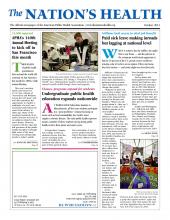A fire can be warm and inviting, like the ones lit on a cold winter’s night and gathered around with loved ones. A fire can be part of a treasured memory, like the kind used to melt marshmallows and tell scary stories at. But a fire can also be devastating and deadly.
Every year from 2006 to 2010, more than 350,000 residential fires happened in the United States, taking the lives of thousands of people. According to the Federal Emergency Management Agency, a fire serious enough to warrant a call to a fire department happens in an American home every 60 seconds. But with a few easy tips and preparations, you can help prevent a fire from happening in your home.
“We can all easily add good fire safety practices to our daily checklists,” says Sandy Facinoli, chief of prevention and information at the U.S. Fire Administration. “If we take the time to think about fire safety, we really can prevent a situation that can quickly turn into a nightmare.”
Everyday tips for fire safety
First up are fires that start due to cooking, which is one of the most common causes of house fires. When cooking, be cautious of any flammable items that are too close to a burner, and be aware of any loose clothing that could catch fire. Most importantly, don’t leave frying, grilling or broiling food unsupervised.
“You need to always be aware of what’s going on in the kitchen,” Facinoli says. If you do need to leave the kitchen while food is cooking, Facinoli suggests taking a big item, such as a ladle or spatula, with you as a reminder to quickly return.
Another major cause of house fires are heating devices, especially electric space heaters. In fact, residential fires are more common in the winter. Facinoli says to place mobile space heaters at least three feet away from any flammable items, such as drapes, upholstered furniture and rugs. And always turn off a space heater when you leave the room.
Read the label and make sure you buy the right extension cord, recommends the U.S. Consumer Product Safety Commission. Overloading or plugging in appliances that use too much wattage can cause an extension cord to overheat and catch on fire. Also, don’t run extension cords under rugs or furniture, and never try to alter a cord or fix a damaged one.
Regular maintenance is a smart fire prevention tactic as well. Facinoli recommends hiring a professional to annually inspect furnaces, fireplaces and chimneys.
Cigarettes are also a major cause of fire and fire fatalities in the home. The U.S. Fire Administration reports that nearly 1,000 people die every year due to fires caused by cigarettes and other smoking materials. And, of course, tobacco use is also bad for your health. If you smoke, think about seeking quitting assistance in your community. But if you do smoke, never do so inside. Always smoke outside, away from your home and be aware of where you put ashes and cigarette butts, Facinoli says.
Sound the alarm
Working smoke alarms can cut your risk of dying in a fire by half, according to the National Fire Protection Association. Facinoli says you should have one smoke alarm in every bedroom or sleep area of the home and on every level of the house. She recommends purchasing a smoke alarm with a long-life battery. However, all smoke alarms should be tested monthly — by pushing the alarm’s test button — to make sure they are working.

Photos and art courtesy iStockphoto. Burning house by Lisa Comegys
Oftentimes, people will disable a smoke alarm if it goes off during cooking. Facinoli adamantly warns against this, as it’s easy to forget to reinstall it. Instead, install the alarm a few feet from the kitchen or simply press the “hush” button.
In the unfortunate event that a fire does break out in your home, every member of your household should be prepared, which means planning and practicing home fire drills in advance. Facinoli says all household members should learn at least two ways to get out of the home. Pick a meeting place far enough away from the home to be safe but still visible to emergency responders so they don’t endanger themselves by needlessly entering a burning home to search for occupants.
If a fire breaks out, you may be tempted to try to save valuable items. Don’t do it, says Facinoli. “Just get out,” she says, and go to a neighbor’s house to call 911.
“Have a plan,” she says. “If you’ve never thought about it or never practiced, it’s going to be very hard in a crisis.”
- Copyright The Nation’s Health, American Public Health Association












